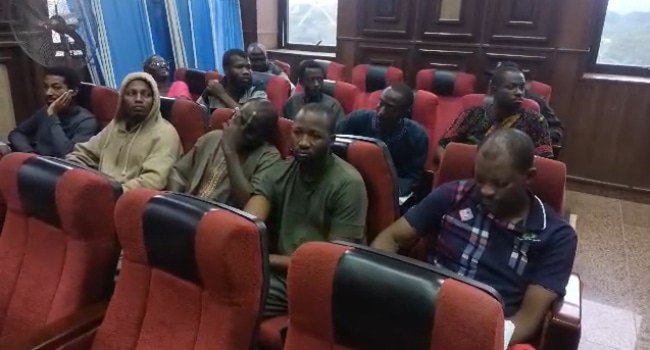The Nigerian Police and National Human Rights Commission on Friday were engaged in à heated debate over the legality of jailing minors arrested at protest grounds for felony and treasonable offences.
The debate took place at the public presentation of a research report titled ‘Beyond the Protests: An Explanatory Study of the #EndBadGovernance protest in Nigeria’ organised by Kimpact Development Initiative in Abuja.
In August last year, Nigeria witnessed widespread demonstrations under the #EndBadGovernance movement, driven by public dissatisfaction to protest the economic hardships and governance issues ravaging the country.
The demonstrations, however, escalated, leading to the arrest of 76 individuals, including 30 minors, who were charged with offences such as treason and inciting a military coup.
The Inspector General of Police had arraigned them on 10 counts bordering on treason, intent to destabilise Nigeria and inciting to mutiny by calling on the military to take over the government from President Bola Tinubu, among others.
However, the President was compelled to grant them pardons following the outrage that trailed their continued detention.
Reacting on Friday, NHRC Executive Secretary, Anthony Ojukwu, argued that the manner the police went about prosecuting the kids without due process was unprofessional.
Ojukwu was represented by the commission’s Head of Monitoring, Benedict Agu.
He said, “It is true the law says no child below seven is liable for prosecution. But as a human rights advocate, we disagree with the police with regard to how those minors were treated. We were among the first few people to interview these children when they were remanded.
“The challenge we had was trying to know the rationale behind bringing up and charging these children for treason. As we all saw, some of them even collapsed in the courtroom.
“So what should be the basis for a mature officer of the law to say that a child who raises another country’s flag is guilty of treason? After all, the same law says there should be a particular due process that should be followed. Why didn’t they follow it?”
But the Force Public Relations Officer, Olumuyiwa Adejobi, noted that the police were not against peaceful protest but causing violence and any act aimed at bringing down the government of the day was treason.
The police spokesman further argued that the suspects were teenagers and not some seven-year-olds as being peddled on social media.
Adejobi was also represented at the event by his deputy, CSP Victor Isuku.
He said, “As of today, the Nigerian Police recognises protests based on a court judgment. If you check online and look at our press releases during the last #EndBadGovernance protest, you will realise the police are not against peaceful protests.
“When you are below seven years, you may not be criminally liable. Let us not play to the gallery. We shouldn’t, because of emotion, throw away the baby with the bath water. The same lawyers who came to lobby and pray the government to capitalise on that incident (#EndBadGovernance protest) at that period are the same people manipulating these suspects.
“Is there anybody that is below 12 years among the suspects? So, when you use the word minors, the law is very clear. The procedure for prosecution of minors is spelled out in the Child Rights Act. What we charged for was a serious offence that included treason.”
Similarly, the Executive Director of Enough is Enough Nigeria, Yemi Adamolekun, raised concerns that it has become worrisome to note that minors are now being arrested for venting their frustration.
Adamolekun also frowned at the rise in the number of pro-government rallies, which she claimed are targeted at resisting and shutting down dissenting voices across the country.
Earlier in his address, KDI Executive Director, Bukola Idowu, explained that their study showed protests such as the #EndSARS and #EndBadGovernance have showcased the remarkable power of civic action in shaping the future of our nation.
Idowu explained that the research also delved into the complexities and implications of protests in Nigeria, examining critical dimensions such as regional responses, governance implications, human rights, the rule of law, and the transformative role of social media in amplifying civic action.
“Nigeria has a history of protests dating back to the colonial era. However, recent movements have demonstrated that protests are not merely expressions of dissent but powerful catalysts for social change.
“By exploring the #EndBadGovernance movement, we aim to contribute to a deeper understanding of the factors driving protests and their impact on governance and human rights. This report transcends being a mere research output; it is a clarion call to action,” he stated.






